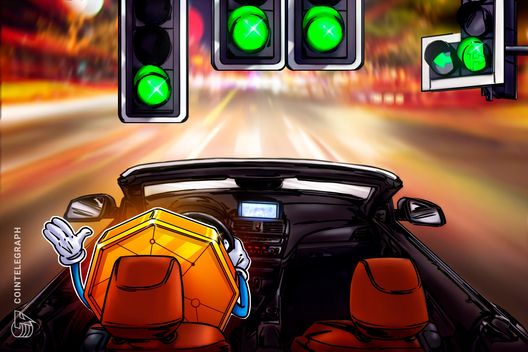
Opinion by: Evan Kuhn, president of DeLorean Labs
When auto manufacturers create a brand-new design, their fragmented logistics and sales cycle mean that also if a client takes down a down payment, they have no practical or reputable method of predicting shipment for that vehicle.
Excited vehicle buyers can wait months and even years after paying their deposit, without recognizing where they sit in the line up for delivery. This is why new models are valued over the sticker price when cars and trucks initially get in the marketplace.
There has actually been no industry-wide option– yet tokenized appointments will open up a multitrillion-dollar market.
The busted reasoning of modern vehicle bookings
Scheduling a vehicle version today is incredibly inefficient. Vehicle buyers pay huge markups when new versions are rolled off the whole lot because there is no insight right into producing timetables.
The choices are, if you want the new automobile currently, you have to pay a substantial costs over the sticker price, and if you’re mosting likely to pay the normal sticker price, you have no say or concept regarding when you will certainly get shipment of your auto. So, exactly how large is this trouble?
A current APAC friendliness study revealed cancellations via Booking.com make up 40 % of profits. In contrast, Expedia sees 24 %, suggesting tens of billions at stake globally, while ticket resale platforms remove 30 % markups, leaving both artists and followers even worse off.
Automobile waitlists continue to be a lot more nontransparent. Dealers have swindled buyers with $ 30, 000 -$ 70, 000 markups on Ford F 150 Lightning orders, showing a profitable secondary market produced completely by details crookedness, also without a defined “underground market.” Also manufacturing endures, with 15 %- 30 % of capacity sitting idle, according to a McKinsey report , since tiny firms lack accessibility to tradable reservation systems.
Smart contracts on the blockchain elegantly fix problems related to details asymmetry. Tokenized level bookings, for example, can escrow deposits onchain, permitting purchasers to trade their placements easily, while designers keep consistent sales energy.
The car market’s $ 50 -billion tokenization opportunity
The automotive market offers an engaging case for reservation tokenization, where phantom waiting lists have long allowed violent markups.
Tesla’s Cybertruck accumulated over 1 million bookings, each underpinned by a refundable deposit of as much as $ 250, representing over $ 200 million of inactive resources that can or else power secondary‑market liquidity instead of being saved in company coffers.
Related: Carmaker DeLorean tokenizes EV bookings on Sui
A tokenized booking system would certainly finish such practices by transparently permitting line settings to be tradable, with producers marketing royalties on second trades. The technical framework already exists. BMW’s venture-capital system has spent extensively in blockchain‑based supply‑chain options, and Mercedes is piloting automatic repayment systems for car‑charging networks. Mercedes’ maker, Daimler, has actually also been exploring decentralized identification, in-vehicle information sharing and automatic payments for electric charging, using blockchain in logistics and expenses.
Take into consideration the ripple effects: An order for a Tesla that is then tokenized could be traded on manufacturing timelines, geographical delivery concerns or personalizations. Early adopters could market their placement in the queue, makers may record secondary‑market worth, and prices would be set transparently, rather than being obscured by dealership markups.
These build-to-sell slots would certainly operate like call options in financial markets, providing owners the right (however not obligation) to acquire later on. If choices transform or demand skyrockets, ports can be marketed easily. This technique would certainly introduce market dynamics to an industry traditionally lacking openness.
Doubters might call this overengineering, however the numbers suggest otherwise. In February 2025 alone, OpenSea taped over $ 211 million in non-fungible token (NFT) trading quantity, capturing 47 8 % of the marketplace.
Seamless individual experience is the missing web link
For mass adoption, blockchain has to end up being undetectable. Encouraging instances include Visa’s explores gasless repayments through Account Abstraction , Circle’s Verite , which makes it possible for customers to show conformity without exposing personal data, and Magic Link ‘s email-based budget gain access to. The goal isn’t to require individuals into crypto, but to install blockchain’s advantages into daily communications, making them smooth, automated and largely undetectable to the customer.
According to Boston Consulting Group , the tokenization of real-world properties might get to $ 16 1 trillion, covering economic items such as insurance coverage, pensions, different investments, home equity, infrastructure and licenses. Redirecting even a portion of that activity to real-world bookings, hotel areas, concert tickets or extra factory time would certainly produce new secondary markets.
The roadway ahead
Nike’s leave from NFTs really did not spell completion for tokenization, yet rather fine-tuned the emphasis. In a similar way, the following breakthrough won’t come from digital art yet from sensible applications: hotel chains generating income from no-shows through open resale markets, carmakers eliminating waitlist scalping with clear slot trading or healthcare providers cutting MRI waste while gaining fees from legitimate transfers.
The trillion-dollar inquiry isn’t whether tokenized appointments will certainly improve industries, but which fields will certainly relocate initially to assert the advantage of open, fluid reservation systems. Those who act now will not just solve old troubles– they’ll unlock completely new markets.
Viewpoint by: Evan Kuhn, head of state of DeLorean Labs.
This short article is for basic details objectives and is not meant to be and should not be taken as lawful or financial investment suggestions. The views, ideas, and point of views expressed right here are the author’s alone and do not necessarily mirror or represent the sights and point of views of Cointelegraph.